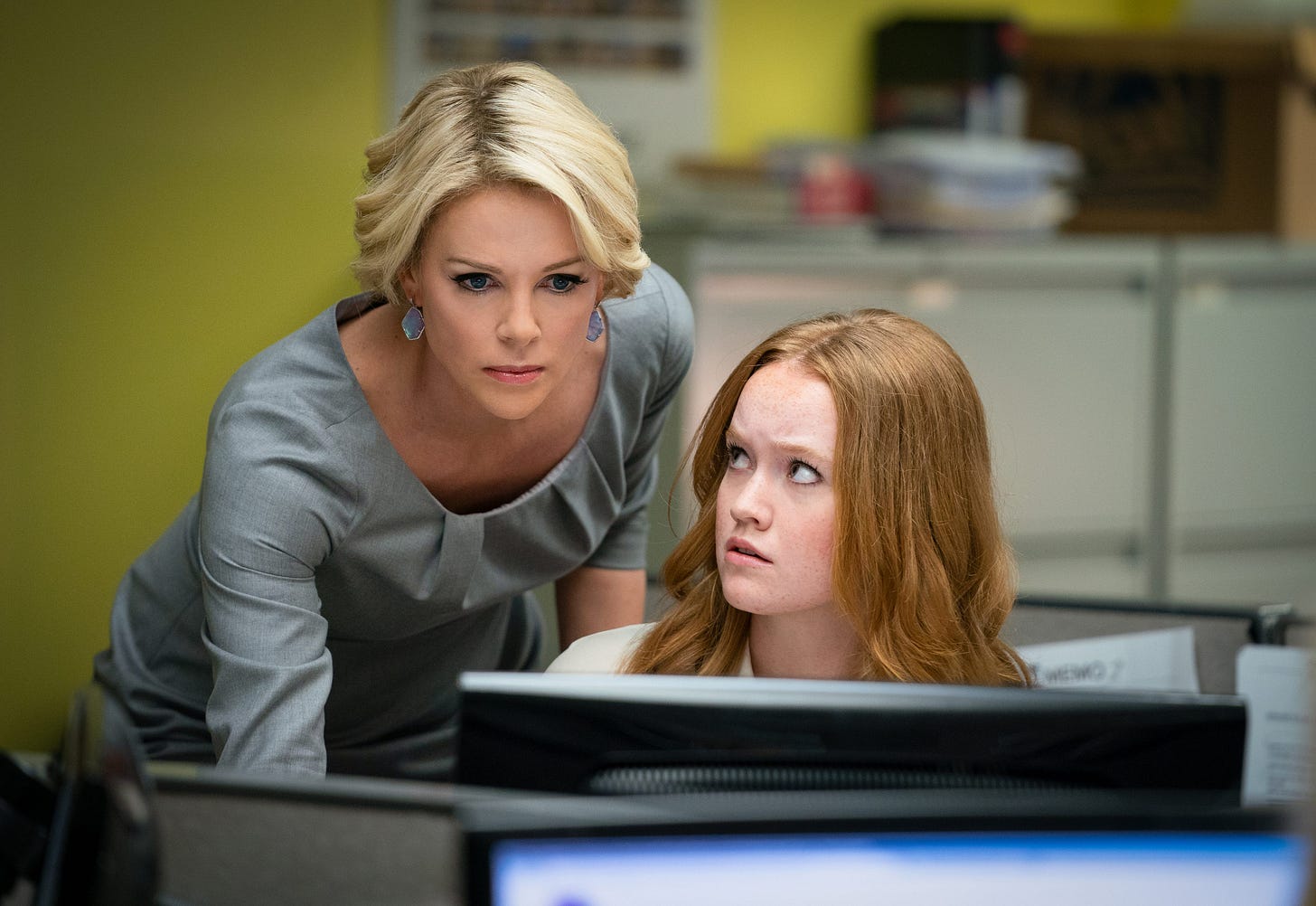Bombshell

I think I might just be tired of the true-story scandal film.
My first inkling of it was Dark Waters last month, in which a usually quirky Todd Haynes directed a shockingly textbook drama about the DuPont chemical company's knowing poisoning of millions of people, complete with all the "How dare they"s and "They knew?!"s you could imagine.
Bombshell is decidedly less conventional in its presentation, thanks to some fourth-wall-breaking from its main cast and snappy editing in the vein of Adam McKay's The Big Short. But structurally, it is much still the same, and I'm beginning to wonder if that's just inherent in Hollywood's approach to this kind of drama.
So take my opinion henceforth with that in mind — I'm over this kind of movie — because otherwise, this is a competently made and well-acted film, even if its story and central players are undercooked.
Bombshell tells the story of the women of Fox News, specifically those who came out with allegations of sexual harassment against chairman and CEO Roger Ailes in 2016, and his subsequent resigning as a result. Three women take center stage in this retelling. Our first introduction is to host and reporter Megyn Kelly (Charlize Theron), who tours us around the Fox News offices and tickles us with tidbits of insider knowledge about the place. We also meet veteran, then-daytime host Gretchen Carlson (Nicole Kidman), who at this point is tired of the constant, misogynist berating and cajoling from her male counterparts at the office.
We are then introduced to Kayla Pospisil (Margot Robbie), the only fictional character of the three leads, a young and green producer.
By the time the events of the film arrive, Gretchen is already sick enough of the sexism around her that she's ready to take action, as we see her meeting with lawyers to lay out her legal strategy. At this point, it's a shot in the dark for her; she hopes, but can't guarantee, that other women at Fox will come forward with similar complaints. Frankly, it's the only way she can make anything happen, so she goes public and waits to see what happens.
At about the same time, Kayla manages to snag a few minutes of time with the top of the food chain himself, Ailes. It's her attempt at getting her foot in the door for a more glamorous and on-screen position at the agency. But it's here that everything changes for Kayla, and not remotely in the way she was hoping. It's sad, scary, and uncomfortable in all the ways it should be.
I'd rather let you experience that one than describe it in detail.
Meanwhile, Megyn has her own history of harassment from Ailes, but wants not to bring it up or be forced to identify with it. Understandable concerns from a personal and career standpoint.
Megyn, Kayla, and Gretchen all cross paths throughout the film, but they aren't besties or seemingly even well-acquainted. What results is a simultaneous three-story film, each following its respective subject as she navigates her own unimaginably difficult place in this controversy. All three leads are great, pulling their own weight to make each of their arcs engaging enough.
Theron gets the most to work with, playing the steely Megyn Kelly, trying to ride the line between practical shrewdness and moral goodness. Her husband (Mark Duplass) supports her whenever he can, but also doesn't hesitate to criticize her when he thinks she's not pushing hard enough against the glass ceiling.
It's Kidman who carries the fiery spirit of the film, though, as Gretchen is the most forthcoming about doing this for herself and for other women. Kidman's tenacity is felt in her terse responses to questioning and short leash for haranguing at the office.
Margot Robbie gets the most emotionally dynamic role, and yet at the same time, the least interesting. Kayla feels designed to be the viewer's self-substitute into the events, a physical manifestation of "what if this happened to me?" And while such a figure is a relevant and valuable piece of a retelling like this one, it often feels the most like an Easy-button for highlighting the most obvious ideas in the film's subtext. I think I'd have much rather delved further into Megyn's and Gretchen's psyche, motivations, and tribulations during all of this than be given a third perspective that is ultimately just a straightforward distillation of what an "average" woman there might have gone through, which in itself feels a little cheaper than the complexities of someone's actual story.
And, as usual, the climax and finale seem to fall a little short of the hard-earned comeuppance that the first two-thirds of the film set you up to want. Maybe it's just part of the nature of being a true-story film, but I would have liked some deeper exploration of the leads' headspaces in the aftermath of it all. When Ailes' resignation finally comes around, the film almost seems more concerned with focusing on him than on the women we've been following the rest of the time. Oops.
Ultimately, despite some kinetic pacing and editing and consistently strong performances from its leading ladies, Bombshell often feels like it doesn't take the extra leap it needs to stand out from the crowd. It's competent in its presentation, but frustratingly un-investigative of its central characters. There's been a rise in great feminist filmmaking dealing with recent and relevant social issues and events, and Bombshell certainly doesn't fail the rest. But it also doesn't do much to expand the conversation or push it forward.
https://www.youtube.com/watch?v=0rBnkBIhoFE&w=585

